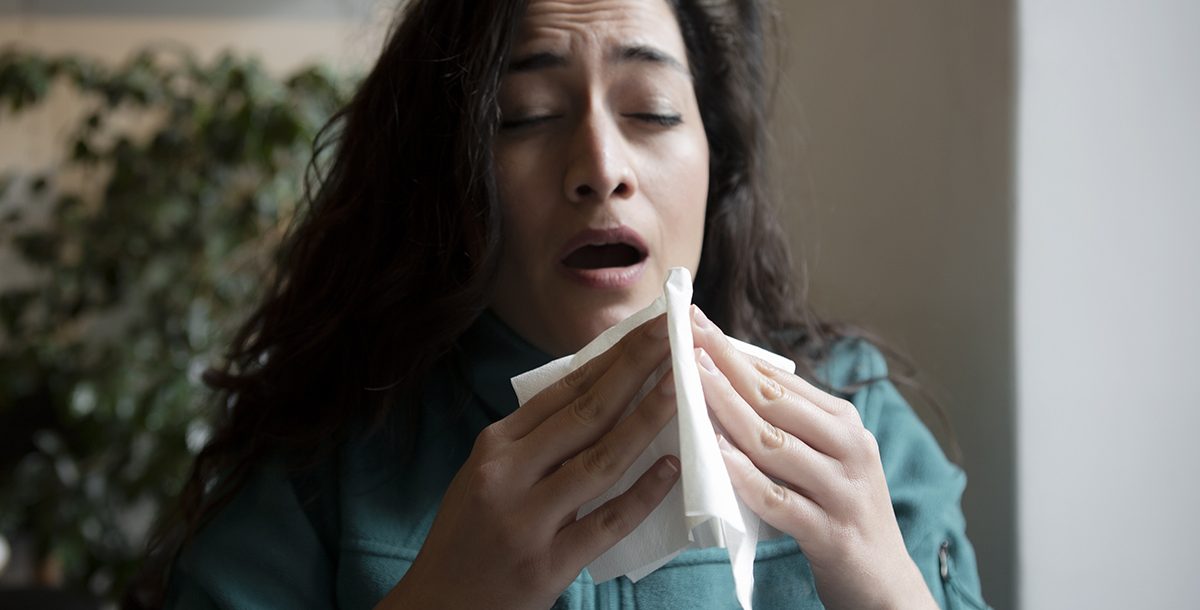You know it’s coming. That tickle in your throat and nose and the overwhelming feeling like there’s no possible way to stop it and then … AH-CHOO! But does your heart stop when you sneeze, or does it skip a beat? What happens?
Wait, what is a sneeze?
Sneezing, also known as sternutation, is the rapid and involuntary expulsion of air from the lungs through the nose and mouth and can be caused by several things. Our body has a natural coping mechanism to get rid of external threats. Sneezing is one of those mechanisms our body uses to get rid of unwanted particles. Some stimulants that can trigger a sneeze are:
- Allergic reaction
- Viral infection
- Change in temperature
- A sudden bright light
Your body forces a sneeze to get rid of a pesky irritant. Irritants range from:
- Germs
- Dust or pollen
What happens when you sneeze?
A message is sent to a part of your brain called the sneeze center. The sneeze center sends signals to the parts of your body via the vagus nerve that need to work together to help you sneeze. Your chest muscles, diaphragm, abdominals, vocal cords and the muscles in the back of your throat all work together to help you get rid of the irritant.
So, does your heart stop when you sneeze?
True or false: Does your heart stop when you sneeze? Myth! Although it may seem that your heart takes a break during a sneeze, this is not the case. When you first inhale before sneezing, the pressure in your chest increases. Then, as you exhale during the sneeze, the pressure drops.
This change in pressure may momentarily affect the rhythm of the heartbeat for a short time. However, it doesn’t stop the heart from beating. Many think that your heart beats at a fixed rate, but this is also not true. So while it may seem like you feel your heart skip a beat when you sneeze, it would have to stop for at least three seconds before a sneeze would be considered “heart-stopping” – something a sneeze is not capable of producing.
There is a phenomenon called sneeze syncope, which occurs when the heart rate and blood pressure drop so low when you sneeze that you feel dizzy or even pass out. While it sounds like this would be the result of your heart stopping or skipping a beat when you sneeze, not so fast. Sneeze syncope is extremely rare and is usually caused by alternative factors, such as medication or a medical condition.
Should I hold in my sneeze?
If you feel the tingly feeling of a sneeze coming on, do not try to hold it in or try to stop it from happening. Sneezes are powerful. If you avoid sneezing, the pressure in your chest increases, as well as in your nasal passages. That built-up pressure in the chest could cause damage to the blood vessels in your eyes, nose or eardrums if it’s held in and redirected to other parts of the body
What’s the best way to sneeze?
With diseases like the flu, the common cold and COVID-19, we all now know that there are better ways to sneeze.
We’ve prepared five things you should do when you’re sneezy – not just out of common courtesy, but to help reduce the potential spread of nasty diseases.
- Be prepared – carry tissues and sanitizer.
- Cover your mouth and nose with a tissue when coughing or sneezing, then dispose of them immediately after and make sure you wash your hands.
- If you don’t have a tissue ready, sneeze or cough into the bend of your elbow or sleeve.
- Make sure to turn your head away from people when you cough or sneeze.
- Clean your hands often and with soap and water, or with an alcohol-based hand sanitizer, for at least 20 seconds.
- Don’t sneeze into your hand. If you sneeze into your hand, clean your hand immediately.
When to see your provider
Viruses that cause illnesses like the common cold can be the culprit of your sneezing and sniffles. These are often treated with over-the-counter medications that target specific symptoms, such as decongestants, cough medicine or acetaminophen, along with rest. But if you have persistent sneezing and sniffles, or congestion and coughing that doesn’t go away after a few days, contact your primary care physician.
While sneezing, runny noses and sniffles are very common and do not usually indicate any serious health concerns, it’s always important to be aware of other symptoms you have with an irritated nose and see a doctor if you have concerns.
Learn about the primary care services we offer at Bon Secours.





